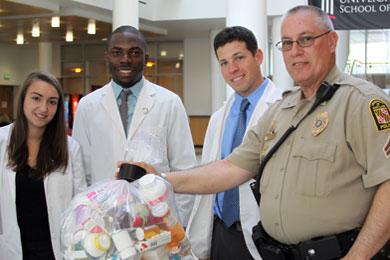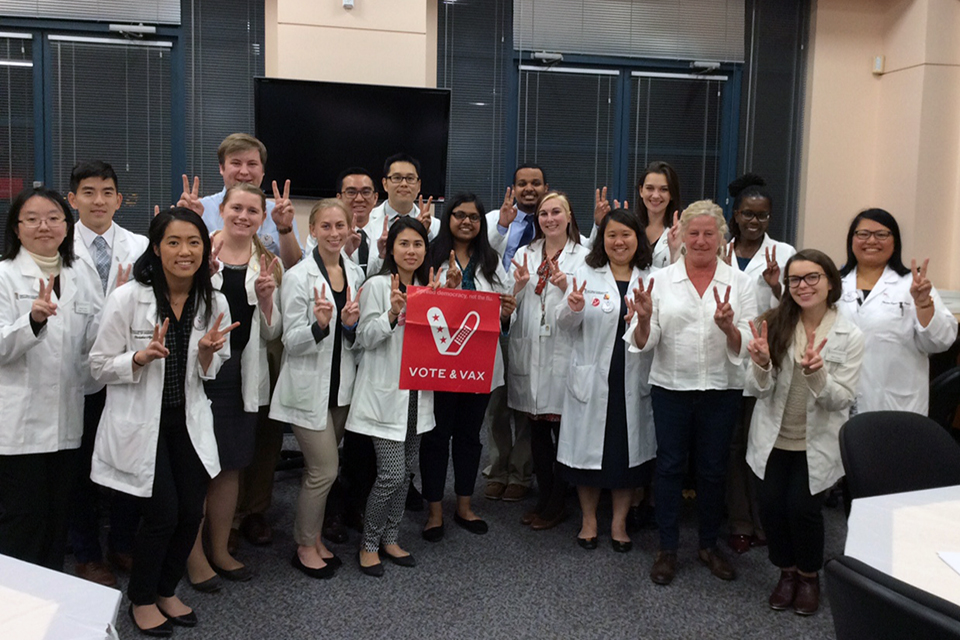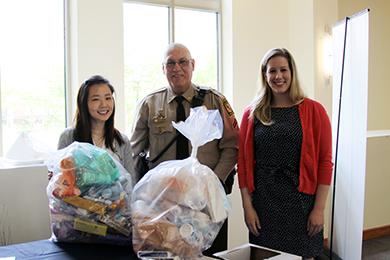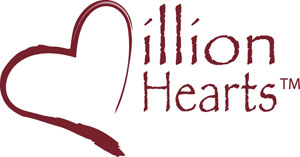Student Pharmacists Lead Successful Third Annual DEA Drug Take-Back Day
Students collaborate with University police and the Maryland Poison Center to collect 83 pounds of expired or unused prescription and over-the-counter drugs.

By Malissa Carroll
May 7, 2013
To help improve medication safety in the local community, the University of Maryland School of Pharmacy participated in the Drug Enforcement Administration’s (DEA) National Take-Back Initiative on April 24 and 27. The Take-Back program hosted at the School of Pharmacy was organized by the American Pharmacists Association-Academy of Student Pharmacists’ (APhA-ASP) Generation Rx, in collaboration with the University of Maryland (UM) Police Force and the Maryland Poison Center (MPC). Student pharmacists collected 83 pounds of expired or unused prescription and over-the-counter medications, making this event the largest of its kind for the School.
“The main goal of Generation Rx is to prevent prescription drug abuse,” says Rilwan Badamas, second-year student pharmacist and chair of Generation Rx. “We know that many people have unused or expired medications in their homes, but they are not sure how to properly dispose of them. This event provided a way for us to collect those medications and safely dispose of them to ensure that they are not illegally sold or abused by others.”
For the Take-Back Day held on April 24, student pharmacists set up a collection site in Pharmacy Hall Atrium. A curbside collection site was available on April 27, in front of Pharmacy Hall. This marked the first time that the School has attempted a drive-thru collection, allowing individuals to drop-off their unused or expired medications at the collection box.
“Without assistance from the students at the School of Pharmacy, this event would not have been the success that it was,” says Corporal John Jones who has represented the UM Police Force at each Take-Back program hosted at the School. “The students have not only educated the individuals who have dropped off prescription drugs, but have also educated me. I hope to continue this partnership with the School of Pharmacy.”
Unused and expired prescription medications present a major public safety issue, and can lead to accidental poisoning, overdose, and abuse. According to a recent report from Safe Kids, a global network of organizations dedicated to providing resources to protect children from unintentional injuries, approximately 86 percent of emergency room visits for medicine poisoning result from children getting into medicine belonging to an adult. In fact, every minute of every day, a poison center receives a call about a potential medicine poisoning for a child age five and under.
“The DEA’s Drug Take-Back Initiative is a great example of different members of the University community working together for a common cause,” says Angel Bivens, RPh, MBA, CSPI, public education coordinator for the MPC. “Pharmacy students and staff from the MPC and University police helped members of the community take the first step towards reducing medicine misadventures by assisting in the removal of unused and expired medications from the home, while still reminding everyone that the MPC is only a phone call away if a medicine misadventure does occur.”
Unused prescription drugs that are thrown in the trash can be retrieved and abused or illegally sold, while those that are flushed can contaminate the water supply. Proper disposal of unused drugs saves lives and protects the environment. Since the DEA launched its National Take-Back Initiative, it has collected more than two million pounds of prescription medications in conjunction with state, local, and tribal law enforcement partners.
“The DEA’s National Take-Back Initiative was a great event for our students,” says Deanna Tran, PharmD, assistant professor in the Department of Pharmacy Practice and Science at the School of Pharmacy and one of the faculty advisors for APhA-ASP. “Through their participation in this event, students had an opportunity to bring awareness to the community, provide educational resources and information about safe disposal of medications and sharps, and answer any questions about medications the public may have.”



